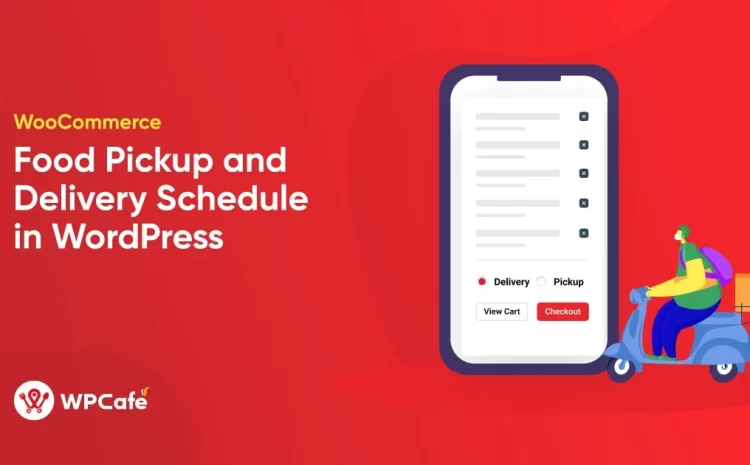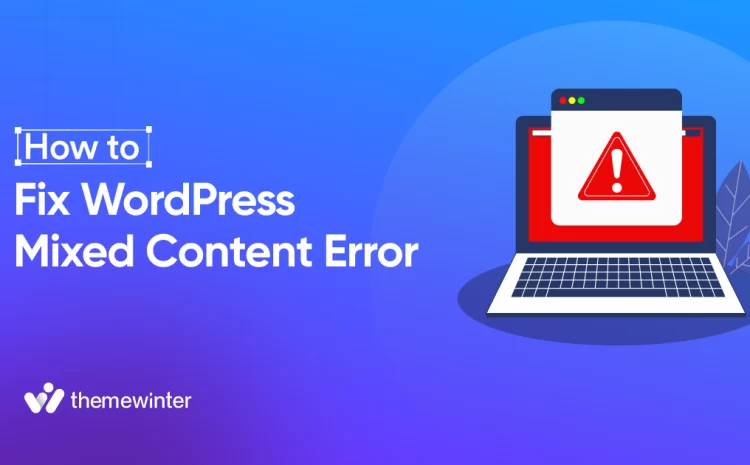9 Expert Tips for Choosing a Venue for an Event
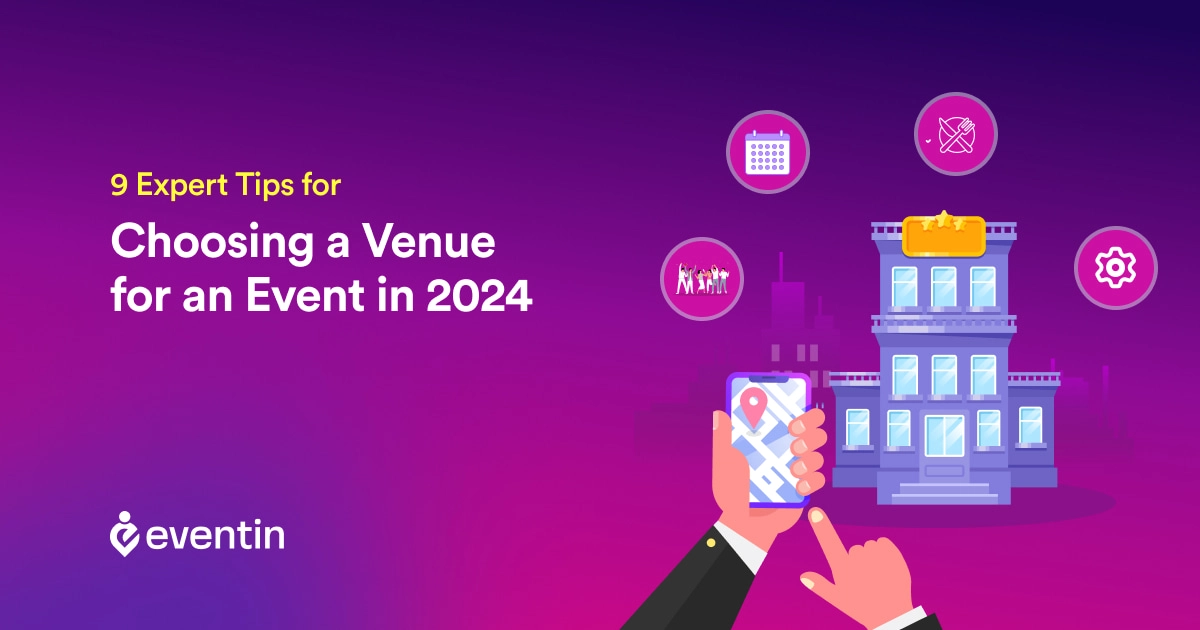
Table of Contents
Just last month, I found myself standing in the middle of what should have been the highlight event of the season. The decorations were flawless, the catering was top-notch, and the entertainment was ready to dazzle.
Yet, something was off!
The venue, chosen for its prestigious address and stunning architecture, was proving to be a mismatch for our needs. Guests were cramped, the acoustics muddled the music, and the evening’s flow was disjointed.
So, It was a stark reminder that choosing the right venue venue can make or break an event.
Now, as an event managing expert, I’ve distilled this hard-earned knowledge into nine practical tips to help you choose a venue that is parfect .
Ready to roll? Let’s deep dive into making your next event a standout success!
Tip-1: Understand Your Event’s Requirements
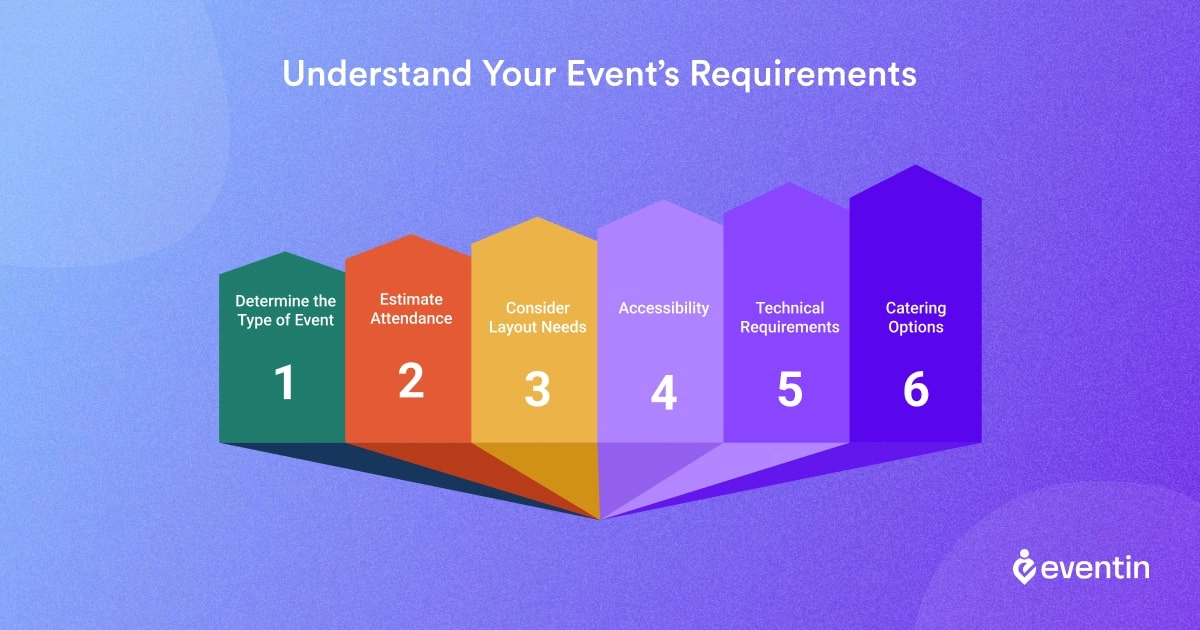
Before choosing a venue for an event, it’s crucial to have a clear understanding of your event’s specific needs. This foundational step ensures that the venue you choose not only fits aesthetically but also caters efficiently to the logistics of your event.
Here’s how to get a solid grasp on venue requirements for an event:
- Determine the Type of Event: Is it a formal dinner, a conference, or a casual party? The nature of your event determines the ambience and facilities you’ll need. For instance, a business conference may require high-tech equipment for presentations, whereas a wedding might need space for a dance floor and band.
- Estimate Attendance: Knowing how many guests you expect will help you in event venue selection that can comfortably accommodate your crowd without feeling overcrowded or unnecessarily vast.
- Consider Layout Needs: Think about the activities planned for the event. Will there be breakout sessions, workshops, or networking areas? This will affect how much space you need and the layout that will best facilitate these activities.
- Accessibility: Ensure the venue is accessible for all guests, including those with disabilities. Check for features like wheelchair ramps, elevators, and accessible restrooms.
- Technical Venue Requirements for an Event: Identify the audiovisual and technological needs of your event. Do you need high-speed internet, projectors, or special lighting? Make sure the venue can support these.
- Catering Options: Does the venue have in-house catering, or will you need to hire outside vendors? Consider if there are kitchen facilities and what equipment is available.
Tip-2: Choose the Right Type of Venue
Before you even see the agenda, the venue itself starts setting expectations. Is it at a swanky art gallery or a cozy restaurant?
The location isn’t just a detail—it’s part of the experience. That’s why choosing the right venue is a pivotal decision in event planning. It’s not just about the physical space; it’s about what the choice of venue communicates to your guests.
Here’s how to make sure the venue type aligns perfectly with the vibe and vision of your event:
- Conference Centers: Think of these as the go-to for educational or corporate gatherings. Their functional design is geared toward learning and networking, helping you keep the event focused and on-track.
- Hotels: Ideal for convenience, especially if you have guests coming from far and wide. Hosting your event in a hotel means fewer logistics for attendees, promoting a higher turnout and smoother experience.
- Banquet Halls: Envision your event draped in elegance—these spaces are perfect for grand receptions or balls where the setting is meant to impress.
- Outdoor Venues: The allure of nature can be irresistible. Whether it’s a beachfront bash or a barnyard barbecue, the choice of an outdoor setting naturally crafts a laid-back, enchanting atmosphere.
- Art Galleries and Museums: Select these when you want the surroundings to speak as loudly as the speakers. They add a layer of cultural richness and sophistication that can elevate any gathering.
- Restaurants and Bars: These venues are ideal for more intimate or casual events. They provide a familiar and relaxed environment, perfect for gatherings where dialogue and interaction are the main course.
- Unconventional Spaces: Looking to make a statement? Venues like converted warehouses or historic buildings offer a unique canvas, ready to be transformed into something truly one-of-a-kind.
Tip-3: Location, Location, and Location!

Think about the last time you attended a memorable event. What made it stand out? Chances are, the location played a starring role.
Choosing the right venue can not only impress your guests but also transform your event’s atmosphere from basic to buzzworthy. So, as you plan your event , keep in mind that the venue’s location is more than a detail—it’s a cornerstone of your event’s success.
Here’s how to zero in on the perfect spot:
- Accessibility: The venue should be easily accessible for all guests, regardless of where they’re coming from. Consider its proximity to major transportation hubs like airports, train stations, and public transit. Also, think about traffic patterns and parking options. A venue that’s a breeze to reach means a higher likelihood that guests will attend and arrive in a good mood!
- Relevance: The location should align with the theme of the event. A high-tech conference might thrive in an urban setting with a modern, innovative vibe, while a retreat could be better suited to a serene, natural environment. Matching the venue with the event’s purpose enhances the overall experience and can make the event feel more cohesive and thought-out.
- Amenities and Services: What does the venue offer right off the bat? Excellent in-house catering, technological support, décor options, and professional planning services can drastically reduce logistical headaches. Also, check for nearby accommodations for out-of-town guests. The right amenities and services can enhance the venue’s appeal and functionality.
- First Impressions Count: Never underestimate the power of a first impression. The venue’s location and aesthetic impact how your event is perceived. An impressive, well-chosen location can excite and engage your attendees from the moment they step foot inside.
- Safety and Comfort: In today’s world, safety cannot be overlooked. Ensure the venue meets all safety standards and can comfortably accommodate your expected number of guests without feeling overcrowded. A safe and comfortable environment is essential for keeping the focus on the event’s agenda and ensuring that everyone has a good time.
Tip-4: Check Availability and Flexibility
Have you ever set your heart on the perfect event date only to find out your dream venue is booked solid?
It’s a common snag in event planning that can throw a wrench into even the most well-thought-out plans. To avoid such disappointments and ensure your event flows smoothly, it’s critical to verify a venue’s availability and its flexibility to adapt to unexpected changes.
Here’s how to navigate these waters effectively:
- Start Early: The early bird not only gets the worm but also the best venue options. Starting your search early gives you a broader selection and better negotiating power. Popular venues can book up fast, especially during peak seasons, so getting a head start is crucial.
- Inquire About Multiple Dates: If you have some flexibility with your event date, ask about availability for multiple dates. This can sometimes lead to better rates or availability. Plus, it gives you options should other planning components shift.
- Understand Cancellation Policies: Life happens, and sometimes plans change. Make sure you understand the venue’s cancellation policy thoroughly. How late can you cancel if you need to? Are there fees involved? Knowing these details upfront can save you a lot of stress and potential costs later on.
- Ask About Plan B Options: Weather, technical issues, or other unforeseen circumstances can impact your event. Check if the venue has options for such scenarios, like indoor spaces that can be used if your outdoor event gets rained out, or if they have on-site technical support to troubleshoot any issues.
- Flexibility with Space Configuration: Depending on the final attendee numbers or any special performances, you might need to alter the space configuration. See if the venue can accommodate different setups and what that entails in terms of cost and logistics.
Tip-5: Budgeting for Your Venue
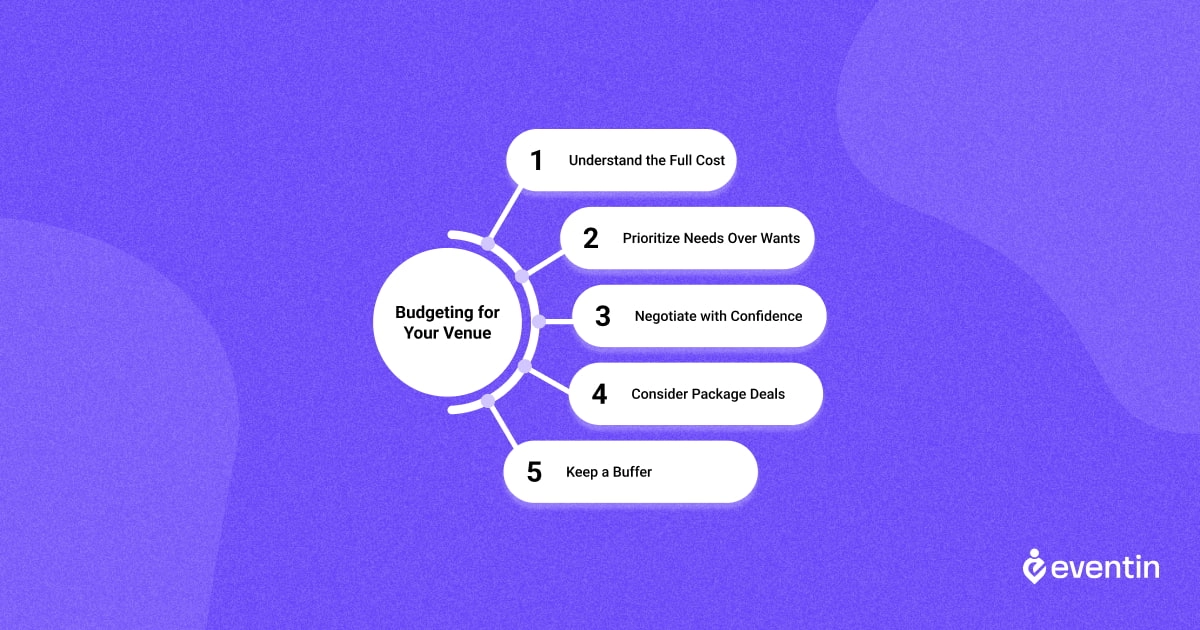
Sticking to an event budget while finding the perfect venue can feel like you’re trying to hit a moving target—especially with prices fluctuating and options varying widely. After all, you should try with heart and soul to ensure that your event attendees are comfortable with the ticket cost.
But fear not! With a strategic approach, you can secure a venue that not only meets your event’s needs but also respects your financial boundaries.
Here are some savvy tips for effective venue sourcing to ensure you stay on track:
- Understand the Full Cost: When you’re venue hunting, it’s crucial to get a complete breakdown of all costs involved. Beyond the rental fee, consider additional charges for catering, technology use, staff, security, and cleanup. Ask venues for a detailed quote and check if there are any hidden fees like service charges or overtime fees.
- Prioritize Needs Over Wants: List out what you absolutely need in a venue versus what you want. This will help you make compromises without sacrificing the success of your event. Essential features might include capacity, essential AV equipment, and accessibility, while less critical features could be luxury decor or high-end technological facilities.
- Negotiate with Confidence: Everything is negotiable. Don’t hesitate to ask for a better price or more favorable terms. Venue managers are often more flexible if you’re planning an event during their off-peak times or if you can demonstrate that you’ll bring in additional business, like booking multiple events or referring others.
- Consider Package Deals: Some venues offer packages that include essential services at a reduced rate. These can often be more cost-effective than paying for each part of your event separately. Make sure to review what each package includes and assess its value against standalone offerings.
- Keep a Buffer: Always allocate a portion of your budget for unexpected expenses. Whether it’s last-minute changes to the guest list, upgrades, or unplanned logistical needs, having a financial cushion will help you handle surprises without panic.
Tip-6: Visit the Venue Personally
Nothing beats the firsthand experience of visiting a venue to get a true feel for the space. While online galleries and virtual tours can be helpful, they often don’t convey the full picture.
Here’s why making a personal visit to choose a venue for an event:
- Experience the Ambiance: Photos and videos can’t fully capture the ambiance of a venue. You need to experience how the space feels, from its lighting and acoustics to its overall vibe. This can significantly influence the mood and energy of your event.
- Assess the Layout: Walking the space allows you to visualize the event flow—from guest arrival to departure. You can identify potential bottlenecks, check if the space is ADA compliant, and ensure there’s enough room for all aspects of your event, including stages, seating, and equipment.
- Meet the Staff: This visit is your chance to meet the venue staff in person. These are the people who will support you during the event, so it’s crucial to gauge their professionalism and responsiveness. A good relationship with the venue staff can make all the difference in event management.
- Inspect Facilities and Amenities: Check the condition of facilities like restrooms, dressing rooms, and kitchen areas. Make sure everything is in good working order and meets your standards and requirements.
- Address Specific Needs: Have a checklist of specific needs or concerns. A personal visit is the perfect time to discuss these with the venue managers. Whether it’s about catering options, technical needs, or decoration policies, getting these answers in person can provide clarity and peace of mind.
Tip-7: Assess Venue Amenities and Services
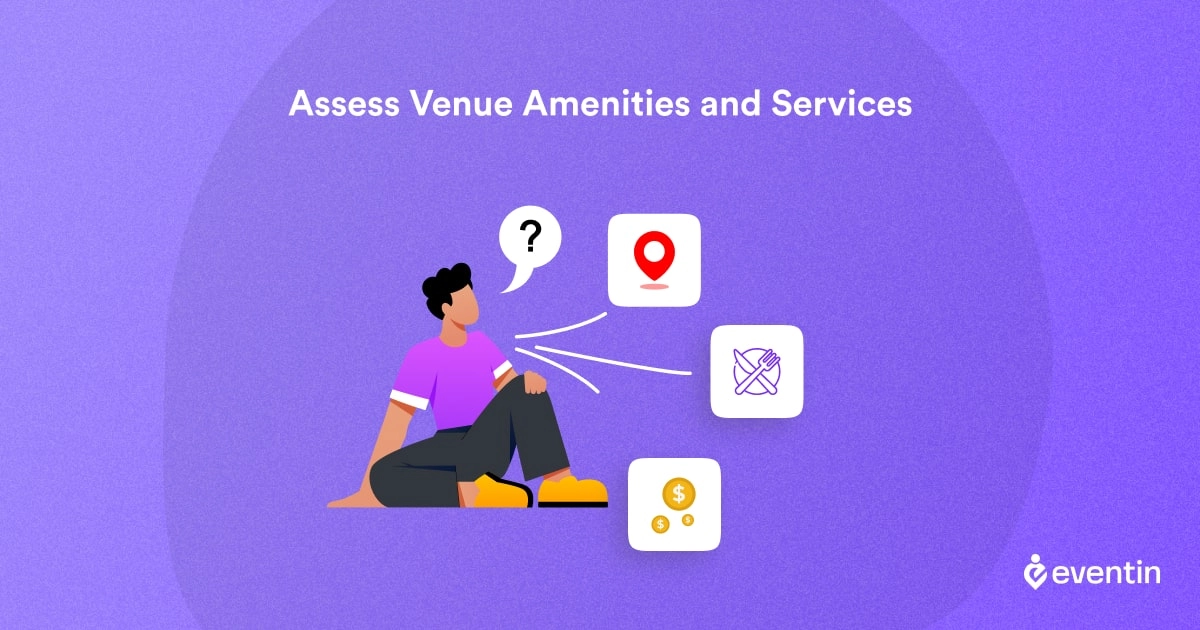
When picking a venue, the devil’s truly in the details. The amenities and services a venue offers can elevate your event from standard to stand out.
As you evaluate your options, consider what each venue offers to ensure it not only fits your needs but also enriches your event.
Here’s how to ensure the venue you choose has everything you need for a smash hit:
- Core Amenities: First things first, check for the non-negotiables: high-quality AV systems, reliable Wi-Fi, and accessibility features. These essentials are the backbone of your event’s infrastructure, ensuring everything runs smoothly and inclusively.
- Culinary Excellence: What’s on the menu matters. Explore if the venue provides in-house catering and taste-test their offerings. Great food can be a conversation starter and mood setter, so ensure their culinary game is strong and adaptable to dietary needs.
- Flexible Spaces: More rooms, more possibilities. Ensure there are ample breakout spaces for sessions or smaller discussions. Versatility in venue space is key for workshops, networking, or any segmented event activities.
- On-Site Support: Don’t go it alone. A venue with a stellar support team, from tech gurus to a dedicated event manager, can take a load off your shoulders. It’s like having a safety net as you walk the tightrope of event management.
- Accommodations and Perks: Comfort is king. If your event spans several days, check for on-site or nearby lodging. Extras like parking, scenic views, or unique architectural features can also enhance the guest experience, adding both convenience and charm.
Apart from these checklists, go for the most important part of an event- easy entry! follow the easy event check in tips, and train your staff on how to cooperate with the attendees. The more flexible the entry is, the more effective the first information you can draw to the participant’s mind!
Tip-8: Read Reviews and References
Before locking down your venue, take a deep dive into what others are saying. Reviews and references are invaluable resources that provide real-world insights into how venues actually perform during events.
Here’s why and how to effectively use them to your advantage:
- Gather Honest Feedback: Start by checking popular review sites and social media. Look for comments on the venue’s service, quality of facilities, and overall experience. Pay special attention to reviews from events similar to yours.
- Look for Patterns: As you read through reviews, watch for recurring themes. Are there consistent mentions of outstanding service? Do multiple reviews complain about the same issue, such as inadequate sound systems or slow service? Identifying these patterns can give you a clear picture of what to expect.
- Check References: If possible, ask the venue for references from past event organizers. This step can provide a more in-depth look at how the venue handles events. Make a quick call or send an email to these references, asking specific questions about their experience, how challenges were handled, and if they would book the venue again.
- Response to Criticism: Also, observe how the venue responds to criticism. A venue that actively engages with feedback and shows a commitment to improvement is a promising sign of good customer service and professionalism.
- Use Reviews to Verify Claims: Use the feedback you find to verify the claims made by the venue in their marketing materials. If a venue claims to have top-notch AV capabilities, but multiple reviewers state otherwise, this could be a red flag.
Tip-9: Negotiate Your Terms

Finalizing your venue isn’t just about signing on the dotted line; it’s about making sure the contract terms align perfectly with your event needs. Negotiating can often lead to better pricing, more flexible terms, and extra perks.
Here’s how to approach negotiations like a pro:
- Understand Your Leverage: Before entering negotiations, know what you bring to the table. If your event is large or you plan to use the venue repeatedly, you have more negotiating power. Use this to your advantage.
- Be Clear on Your Must-Haves: Make a list of non-negotiables before the negotiations start. Whether it’s specific dates, catering options, or technical requirements, knowing exactly what you need will help you communicate clearly and effectively.
- Ask for Package Deals: Many venues offer packages that bundle services at a discounted rate. Ask about different packages and compare these to your requirements and budget. Sometimes, customizing a package can be more cost-effective.
- Discuss Payment Terms: Cash flow is crucial, so discuss payment schedules. Instead of a standard 50% upfront payment, you might negotiate a lower deposit or a staggered payment plan that works better for your event budgeting.
- Consider Add-Ons and Perks: Don’t hesitate to ask for additional perks. Venues can often throw in a few extras at no additional cost, such as high-end AV equipment, upgraded chairs and tables, or extended hours.
- Prepare to Walk Away: Always be prepared to walk away if terms do not meet your event’s needs or if the venue isn’t willing to negotiate reasonable adjustments. This mindset often puts you in a stronger negotiating position.
- Get Everything in Writing: Once you’ve reached an agreement, ensure all negotiated terms are included in the contract. This avoids any misunderstandings and ensures both parties are clear on the expectations.
Final Suggestion: Seal the Success of Your Event

As we wrap up our exploration of expert tips for effective venue sourcing the perfect venue for your event, remember that the final choice is a blend of foresight, flexibility, and follow-through. Also, you might have to take improvised steps to ensure a good venue for your event attendees.
Following a step-by-step process can help you in this case.
Here’s your takeaway to ensure that your event not only runs smoothly but also leaves a lasting impression:
- Step-1 : Embrace Flexibility: Always be prepared for the unexpected by staying adaptable throughout the planning process. This flexibility will help you handle any last-minute changes with grace and efficiency.
- Step-2 : Foster Strong Communication: Maintain a clear and continuous dialogue with your venue contacts. Regular updates and open lines of communication are your best tools for ensuring all details are aligned with your vision.
- Step-3 : Conduct Thorough Reviews: Don’t forget to revisit your initial venue requirements and confirm that all criteria are being met as your event approaches. A final walk-through a few days prior can be crucial to catch any oversights.
- Step-4 : Gather and Apply Feedback: After the curtains close, gather feedback from attendees and staff. This insight is gold for refining your approach to future events, helping you build on successes and learn from any shortcomings.
📚 More to Read:
🔥 How to Create Attendee Registration with Free Ticketing System | Learn More
🔥 How to Avoid Event Ticketing Mistakes: The Ultimate Guide | Learn More
🔥 How to Manage Attendees and Grow Attendee List on WordPress Events: 3 Simple Steps | Learn More
Frequently Asked Questions (FAQ)

How early should I start looking for a venue?
It’s advisable to start searching for a venue at least 6 to 12 months in advance, especially if you’re planning an event during peak seasons or want a popular venue. This timeline can give you enough room to compare options and secure your top choice.
What should I do if my preferred dates are not available?
Flexibility is key. Consider alternative dates, or ask the venue about cancellations or waitlisting options. Sometimes, shifting your event by just a day or two can open up availability.
How do I ensure the venue meets all my technical needs?
Specify your technical requirements during initial discussions and confirm that the venue can provide everything needed. It’s also a good idea to have a tech run-through before the event to troubleshoot any potential issues.
What are some hidden costs I should be aware of when booking a venue?
Always ask for a detailed breakdown of costs. Common hidden fees include service charges, overtime fees, cancellation fees, and costs for additional services like cleanup and security.
Can I bring my own vendors, or do I have to use the venue’s services?
This depends on the venue’s policy. Some venues allow you to bring external vendors, while others require you to use their in-house services or choose from a preferred vendors list. Clarify this early in your planning process to avoid any surprises.
What are some tips for negotiating with a venue?
Be clear about your event budget and needs from the start. Don’t be afraid to ask for discounts or added perks, especially if you’re planning a large event or considering multiple bookings. Also, showing willingness to adjust your event date to a less busy time can leverage better terms.
